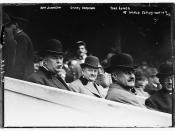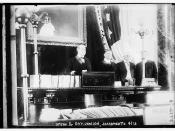Do Ends Justify the Means?
"The ends justify the means" to me means that one should use any means necessary to accomplish what one wants. In certain times of our history this could have been the basis for survival. In today's society a person should be careful of what they say or do. Leaders statements can be held to a high standard of truthfulness. A leader should not stretch, twist, or distort facts and get away with it. President Johnson's distortions of the truth about Vietnam forced him to stand down from reelection. President Nixon's false statements about Watergate forced his resignation, and now President Bush is under the spotlight because of his possible distortions on the facts about Iraq. Leaders of today are held accountable for their actions; their decisions may or may not result in the ends that they desired.
President Johnson wanted a war in Vietnam.
He wanted it to help his friends who owned defense companies to do a little business. He needed it to get the Pentagon and the CIA to quit trying to invade Cuba. And most of all, he need something to convince the American people that there was no other choice but war. An official story was released to the public that North Vietnamese torpedo boats launched an unprovoked attack on a the USS Maddox while it was on a routine patrol. The next day two aircraft carriers retaliated. Many people think that the ship was aggressively gathering intelligence and the torpedo boats never attacked. Three days later congress passed the Gulf of Tonkin Resolution, which gave President Johnson the power to resolve the conflict with any means necessary (Williams). The Johnson administration had wanted to have this power and some believe the events were manufactured in order to receive this...


![[Portrait of Bunk Johnson and Maude Johnson, Stuyvesant Casino, New York, N.Y., ca. June 1946] (LOC)](https://s.writework.com/uploads/17/171599/portrait-bunk-johnson-and-maude-johnson-stuyvesant-casino-n-thumb.jpg)